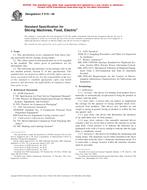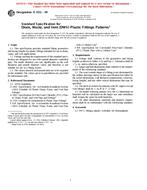1.1 These test methods cover procedures for determining the ability of photovoltaic modules to withstand the mechanical loads, stresses and deflections used to simulate, on an accelerated basis, high wind conditions, heavy snow and ice accumulation, and non-planar installation effects.
1.1.1 A static load test to 2400 Pa (50 lbf ft-2) is used to simulate wind loads on both module surfaces corresponding to a wind speed of 58 m s-1 (130 mph).
1.1.2 A static load test to 5400 Pa (125 lbf ft-2) is used to simulate heavy snow and ice accumulation on the module front surface.
1.1.3 A twist test is used to simulate the non-planar mounting of a photovoltaic module by subjecting it to a twist angle of 1.2° (1/4 in. per ft).
1.1.4 A cyclic load test of 10 000 cycles duration and peak loading to 1440 Pa (30 lbf ft-2) is used to simulate dynamic wind or flex-type loading which might occur at highway speeds for photovoltaic modules mounted, for example, on a truck, recreational vehicle, or trailer.
1.2 The values stated in SI units are to be regarded as the standard. The values given in parentheses are provided for information purposes only.
1.3 These test methods define photovoltaic test specimens and mounting methods, and specify parameters that must be recorded and reported.
1.4 Any individual mechanical test may be performed singly, or may be combined into a test sequence with other mechanical or nonmechanical tests, or both. Certain preconditioning test methods such as annealing or light soaking may also be necessary or desirable as a part of such a sequence. However, the determination of such test sequencing and preconditioning is beyond the scope fo these test methods.
1.5 These test methods do not establish pass or fail levels. The determination of acceptable or unacceptable results is beyond the scope of these test methods.
1.6 These test methods do not apply to concentrator modules.
1.7 There is no similar or equivalent ISO standard.
1.8 The following precautionary caveat pertains only to the hazards portion, Section 6, and the warning statements, 7.5.3.2 and 7.6.3.3, of these test methods. This standard does not purport to address all of the safety concerns, if any, associated with its use. It is the responsibility of the user of this standard to establish appropriate safety and health practices and determine the applicability of regulatory limitations prior to use. See Section 6 for additional precautionary information.
Product Details
- Published:
- 06/10/2001
- Number of Pages:
- 5
- File Size:
- 1 file , 81 KB


